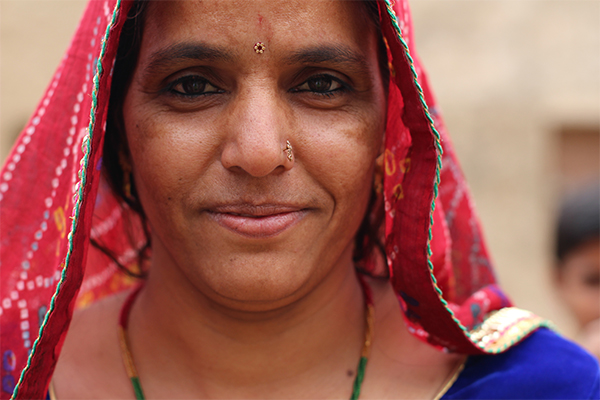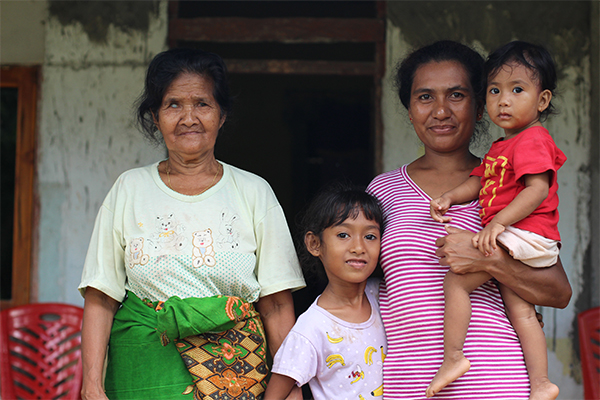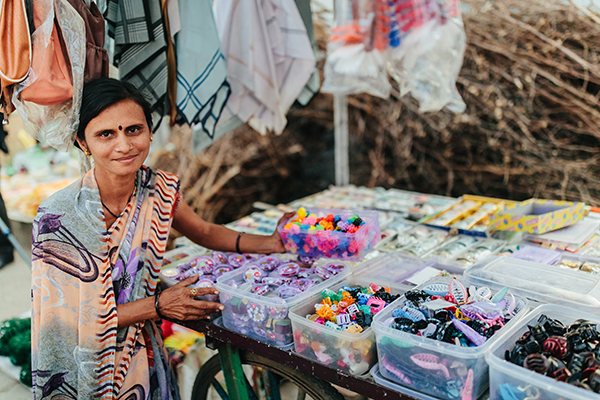Closing the gender gap

Women earn less, own less and learn less than men. For women living in poverty, their ability to save and borrow is further limited. So how can microfinance help close the gender gap and improve lives?
Who are the unbanked?
According to the World Bank, a person is financially included if they have “access to useful and affordable financial products and services that meet their needs, transactions, payments, savings, credit and insurance.”
Globally, about 1.7 billion people remain unbanked – without an account at a financial institution or with a mobile money provider. Women are overrepresented, making up 56 per cent – or 980 million – of all unbanked adults. This limits their ability to save, borrow money and make and receive payments, increasing their vulnerability and susceptibility to fraud.
People living in poverty are also overrepresented. The majority of unbanked adults live in developing countries, with India and Indonesia ranking in second and fourth place respectively. Twice as many unbanked adults live in the poorest households in their economy as in the richest ones. Even when they do have accounts, they are often unused.
Women may be excluded from traditional financial services because of:
- lack of identification, collateral or credit
- a lack of financial literacy
- limited access to technology
- social and cultural norms
- reduced mobility
Lack of identification
Lack of official identification is one of the major barriers to women opening a bank account. In low-income countries, 44 percent of women do not have an ID, with lower-educated women and those living in rural areas more likely to struggle to prove who they are.
Alexandra Doyle, Opportunity’s Program Lead and Evaluation Manager, said women in poverty are also faced with difficult and often complicated processes to access capital.
“Banks require official documents that they [women] often don’t possess along with a lack of ownership of assets to receive credit,” she said.
“With low levels of literacy and no income they therefore have less access to technology. This in turn means it is more expensive for the formal financial institutions to reach women who are isolated by geography, literacy and access to technology.”
“Women in poverty face fewer opportunities to access basic health care and education..."
In India, social norms are another fundamental constraint for women living in poverty in their demand for financial products and services. Women are not expected or encouraged to be financially independent or to make financial decisions concerning the family. Very often, they lack their own means of transport and husbands restrict their mobility outside the home thus limiting their ability to interact with financial institutions.
“Women in poverty face fewer opportunities to access basic health care and education which limits their ability to find employment or start a business – this in turn perpetuates the poverty they are in,” Alexandra said.

Lack of accesss to financial services means women living in poverty struggle to overcome shocks. © Sarah Gray
Coping with shocks
In times of crisis—and most likely to be seen on a large scale throughout the COVID-19 pandemic—women living in poverty will struggle to overcome shocks.
“A lack of access to basic financial services coupled with no savings makes women particularly vulnerable to economic shocks which often leads to over-indebtedness and drives them down a poverty cycle spiral,” Alexandra said.
In the face of lockdowns, many women—who already rely on intermittent work—could face months without a sole income source. With little savings to fall back on, they may struggle to feed their children, keep them in school and access health care.
As the primary caregivers in a family, women will bear the brunt of any health crisis. Women already spend significantly more time than men on unpaid care and domestic work, leaving less time for economic participation. Women are more likely to care for sick family members or their children in the face of school closures, putting them at higher risk of exposure to the virus and burdened with more household tasks.
"This access to financial services means women are empowered to make important decisions for themselves and for the family."
Financial services and insurance products help households anticipate and recover from the effects of shocks. Opportunity is dedicated to ensuring families can sustain a livelihood and rebuild following a crisis, such as COVID-19. Alongside our program partners, we are restructuring loans by introducing grace periods and flexible repayment terms to accommodate the immediacy of the crisis. Our partners are also offering capital to ensure either existing businesses can restart or new businesses can be developed in their place.

With a loan through Opportunity International Australia, Ujjawala started her own business and can save for the future and afford to send her children to school. © Kim Landy
Lifting women out of poverty
Opportunity provides funding and support to its network of partners in India and Indonesia to provide financial services to people in poverty. Microfinance institutions provide a range of services such as credit, savings and insurance, and non-financial services such as financial literacy and women’s empowerment training.
Opportunity currently provides 6.7 million small loans to families throughout Asia – 95 per cent of them are to women. When women have access to financial services, there is flow on benefit in the well-being of their children and families as they are more likely to spend their income on nutritious food, healthcare and education.
“By extending a small loan to women, they are given the opportunity to start a small business, earn an income and to save. This access to financial services means women are empowered to make important decisions for themselves and for the family,” Alexandra said.
“Being included in a loan group and running a business, these women start to build more connections in their community which leads to a greater mobility outside the house, a sense of social connectedness, increased confidence, hope and dignity.”
Learn more about Opportunity International Australia's
impact in India and Indonesia